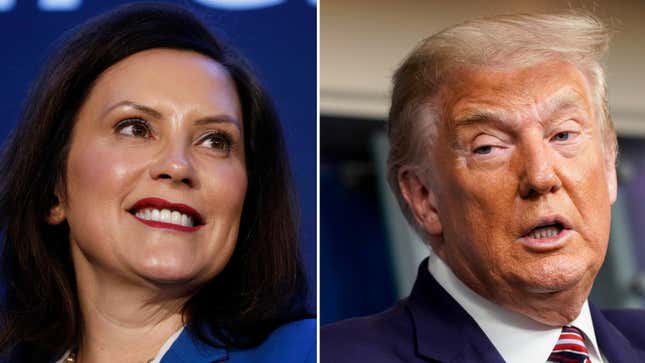The Gretchen Whitmer Kidnap Plot Was a Direct Result of Donald Trump's Rhetoric
Politics

On March 17, days after Michigan Governor Gretchen Whitmer issued shutdown orders in her state in an effort to slow the spread of covid-19, Donald Trump decided to go on the attack. Describing Whitmer that day as the “failing Michigan governor,” in subsequent weeks he would double down on his misogynistic criticism. She was “Gretchen ‘Half’ Whitmer” and “way over her head,” she was “the woman in Michigan,” the “young woman governor” whose name he couldn’t even bear to utter. “Liberate Michigan,” Trump urged in April, giving his overt support to agitators who had gathered at the state capitol days earlier to protest Michigan’s stay-at-home order, some armed in paramilitary gear and carrying Confederate flags and swastikas and calling for explicit violence against the governor.
Trump’s rhetoric put a target on her back and all but gave the thumbs up to violent actors
Whitmer has been one of the nation’s most vocal critics of the Trump administration’s response to the pandemic, and Trump’s reaction has been to not just delegitimize her authority but to encourage threats against her. Trump’s rhetoric put a target on her back and all but gave the thumbs up to violent actors, with predictable and potentially dangerous results. Last week, the FBI revealed that thirteen men, some of whom were members of the rightwing militia Wolverine Watchmen, had plotted to kidnap Whitmer, whom they described as a “tyrant bitch,” and put her on trial for tyranny. Their goal? To incite a “civil war.” Some of them had attended the anti-lockdown protests held earlier in the year, with one even appearing on stage. According to the FBI, the group began planning right around the time that Trump had called for the state to be liberated, going so far as to hold training exercises, purchase a Taser, test explosives, and conduct surveillance of Whitmer.
-

-

-

-

-

-

-

-

-

-

-

-

-

-

-

-

-

-

-

-

-

-

-

-

-

-

-

-

-

-

-

-

-

-

-

-

-

-

-

-








































